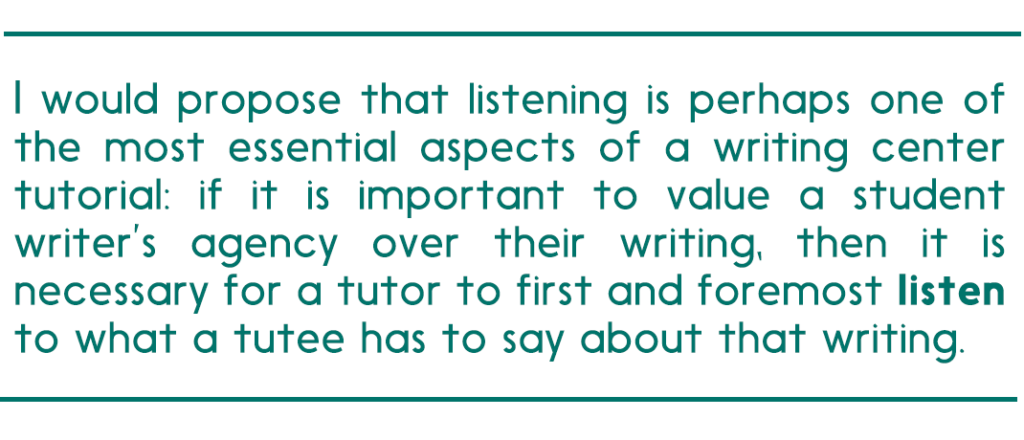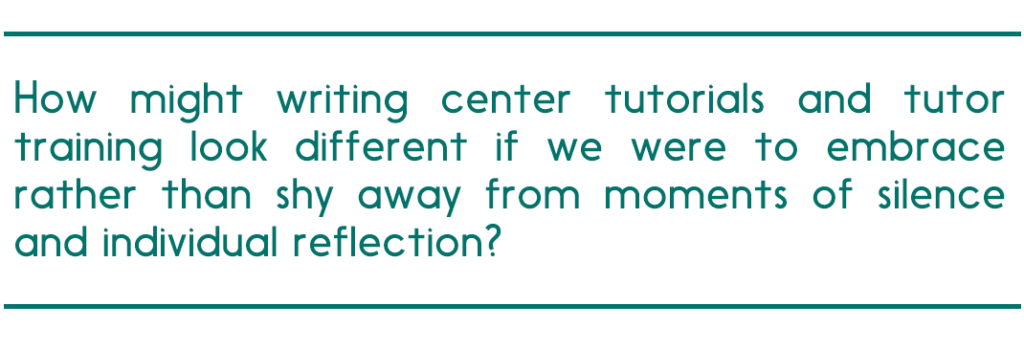By Shannon Mooney, Mount Holyoke College
Many years ago, while I was working as an undergraduate tutor, students from a local high school visited our writing center as they worked towards implementing a center at their school. During a group lunch, one of the high schoolers posed a question to our writing center’s tutors and staff: How do tutors who are shy or introverted manage their anxiety or nervousness when interacting with so many different people in writing center spaces? As a shy tutor, I should have attempted to answer the question; instead, I remember it being met with silence. Ironically, this is likely because introverts like myself tend not to speak up before we’ve had sufficient time to fully articulate a thought—thinking out loud isn’t really our thing.
But there were other reasons I was unable to offer a response to the student’s question that day: I did not want to publicly acknowledge or embrace my identity as shy, and I did not yet recognize the ways that my introversion benefits my tutoring practices. After all, shyness is often positioned as a trait that must be worked beyond, pushed through, and grown out of; I saw my shyness as a shameful trait, a sign of immaturity and a lack of confidence, a quality that had received criticism from teachers for as long as I could remember. This is a common experience for people who are quiet: as a tutor I interviewed for this post expressed, “I’ve encountered plenty of people who make generalized assumptions about my identity based on my silence and introversion…I’ve had people (generally strangers) ask me ‘Do you speak English?’ after I hesitate and create a period of silence after being asked a question.” Silence generally makes people uncomfortable and is assumed to be an unintentional symptom of something else: a miscomprehension, a language barrier, or a lack of engagement.

There are reasons why we think of shyness in this way: in her book Quiet: The Power of Introverts in a World that Can’t Stop Talking, Susan Cain argues that U.S. education systems have historically privileged qualities associated with extroversion, prioritizing activities like group work over individual reflection and associating verbal participation with engagement and intelligence. Though I’ve always found writing centers to be inclusive spaces, more welcoming than most classroom environments I’ve encountered, I still felt that they were spaces that tended to reward extroversion. This is perhaps because so many of the foundational texts I encountered in my writing center training seemed to present shyness, silence, or introversion as characteristics that were detrimental to a tutorial’s productivity. When quietness is discussed, it is often in the context of tutees and student writers whose silence is interpreted as resistance or a lack of engagement during a session. Even the ways that writing center theory considers collaboration—the foundation of writing centers, essential to their functioning—seem to value extroversion, often emphasizing the importance of conversation and talking through ideas, and of a tutor’s responsibility in verbally drawing out these ideas.
But what about tutors who find themselves on the more introverted side of the social spectrum, who do not necessarily view themselves as “big talkers”? Much scholarship that explores silence or resistance in tutees often assumes that tutors themselves have little experience with feeling shy, withdrawn, or introspective. For example, Muriel Harris’s “Talk to Me” instructs tutors: “If you meet up with a truly quiet person who has little to say, you don’t have to fill the silence with talk. Let that person process what is being said and leave some quiet time for her to think about your question” (30). Though this recommendation hints at the productive potential of quiet moments, it also presumes that all tutors have the natural inclination to “fill silence with talk” and, similarly, that it is typically only tutees who are the quiet ones, and not tutors themselves.

In reflecting on my own experiences and in speaking with current tutors at the UMass Amherst Writing Center, I want to work towards filling the gap that fails to take into consideration how shy tutors navigate sessions, and how they see their introversion benefiting their tutoring practices. After all, when given the time to consider their introversion, many tutors recognize the benefits of this quality. One tutor expresses that: “My introversion leads me to listen more and to ask questions to make sure I am understanding the tutee to the best of my ability before I speak. I prefer to speak when I have understood everything a tutee has told me to avoid confusion.” I would propose that listening is perhaps one of the most essential aspects of a writing center tutorial: if it is important to value a student writer’s agency over their writing, then it is necessary for a tutor to first and foremost listen to what a tutee has to say about that writing.
Introversion is also important for recognizing and privileging the need for solitary reflection. Some of the most fruitful moments I’ve had in a tutoring session have been when I’ve stepped away for a few minutes in order to give a tutee time to reflect and write on their own. These moments that seem “quiet” to an outside observer are actually quite active for the student writer, who can take the opportunity to assemble their own ideas regarding what we’ve been working on. As one tutor notes: “I can remember especially when I first started tutoring, I was nervous about filling a 45–minute session with 45 minutes of words. But, as someone who is a bit quieter, I often find that moments of silence and reflection can be just as useful in a tutoring session…I leave a lot of space for the writer to fill the session with their thoughts, ideas, observations, or concerns.”

In order to understand how different individuals navigate social situations, it’s also necessary to consider how introversion intersects with one’s various identity categories. One tutor I spoke with, who identifies as a Black, queer woman, expresses that: “In certain spaces or sessions, I am apt to be more reserved or withdrawn as a means of self-protection,” and adds that this is especially true when engaged in sessions where she perceives the tutee to be potentially intolerant of her identities. In this case, then, introversion or guardedness works as a tool for shielding oneself from harm. This example demonstrates the need for respecting and honoring shyness or introversion as qualities used for working through feelings of vulnerability.

How might writing center tutorials and tutor training look different if we were to embrace rather than shy away from moments of silence and individual reflection? How can we begin to reframe these moments not as “awkward” or “strained,” but instead as natural parts of the writing process? And finally, what might it look like to think about quietness as an alternative means of engagement? Others have already begun this work: for instance, Mitch Nakaue calls for embracing silence in a tutoring session, and argues that “in our enthusiasm and willingness to embrace the assumptions about the positive relationships we see between talking and thinking (and talking and writing), we should not rush to interpret a lack of talking as a lack of thinking.” Indeed, honoring moments of quiet in a session is important not only for valuing the contributions of introverted tutees, but also for supporting tutors who find that they can better process information and articulate their thoughts after a moment of silence. Encouraging shy tutors to recognize the values they bring to a session can help in developing and fostering their individual tutoring philosophies, as well as those belonging to the writing centers they work in.
Works Cited
Cain, Susan. Quiet: The Power of Introverts in a World That Can’t Stop Talking. Broadway Paperbacks, 2013.
Harris, Muriel. “Talk to Me: Engaging Reluctant Writers.” A Tutor’s Guide: Helping Writers One to One. Ed. Ben Rafoth. Heinemann, 2000. 24–34.
Nakaue, Mitch. “In Praise of Quiet.” Another Word. Writing Center at the University of Wisconsin-Madison. 8 Apr. 2013.

Shannon Mooney is a Visiting Lecturer at Mount Holyoke College for the 2022-23 academic year. She received her PhD in English and American Studies from the University of Massachusetts Amherst, where she was also an Assistant Director at the Writing Center.


great article you got here really gave me enough tips on how to work on my shyness attitude